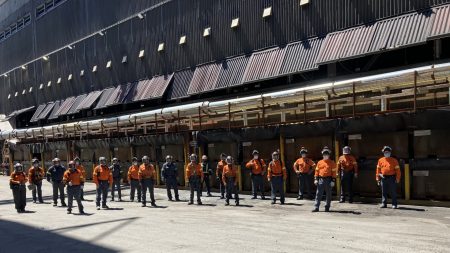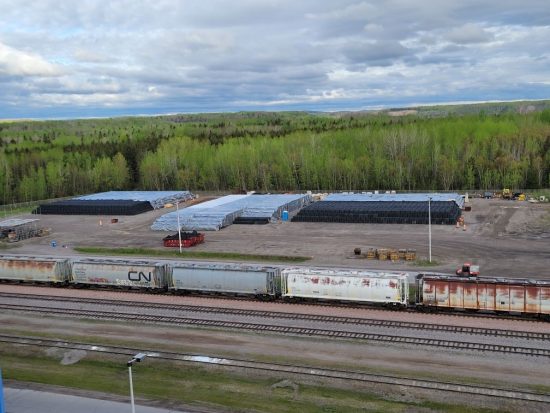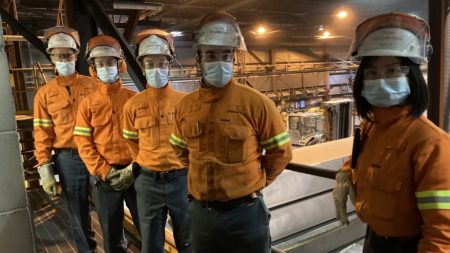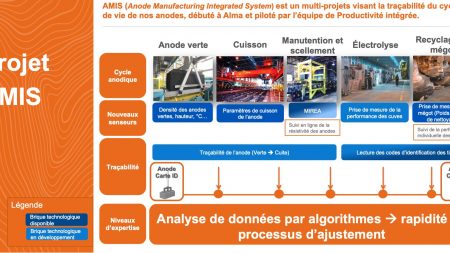Producing Anodes for Arvida at Grande-Baie Works: a Major Feat!

When a crack was perceived on the anode press at Arvida Works, the Carbon sectors of Arvida Works and Grande-Baie Works took on the unique challenge of manufacturing anodes for a different technology and raw materials.
While Arvida Works was operating at increased amperage and all was running smoothly, a major crack was found on the cylinder of the anode press. “As soon as we noticed the crack, we decreased cylinder pressure to keep the press running,” explained Kathia Rainville, Process Coordinator, Arvida Works. “We also assembled an emergency response team to find a solution.”
As external orders were not an option, it was suggested that operations at Grande-Baie Works be adapted to produce anodes for Arvida. “No one had ever done this in the past. It was a very bold idea,” explained David Gignac, Mechanical Engineer, Paste Plant, Grande-Baie Works. “There was a lot of collaboration and sharing of technical information throughout the region.”
The teams at Arvida Works quickly went into solution mode. “This breakage was a real nuisance for us,” said Lisa Laforte, Manager, Business Improvement. “Initially, we reached out to Alma Works, but for technical reasons it was ultimately the team at Grande-Baie Works that came to our aid.
To gather more information, the team contacted a facility in Greece, one of the few sites in the world that produces double anodes. Since Grande-Baie Works’ anodes were about twice the size of Arvida’s, a plan had to be drawn up, and then the team got to work.
We designed the new moulds internally, and Industrie Dodec manufactured them,” explained Jacques Guay, Mechanical Technician, Anode Rodding and Bath Treatment Plant. “It took us three days to reconfigure moulding machine #2 at Grande-Baie Works. With these new moulds, we were able to produce two anodes at the same time with two matrices, one counterweight and one hopper, at a rate of 40 anodes per hour.”
A major adjustment was made on the labour front. The operating schedule for the Grande-Baie Works Paste Plant was adjusted from five to seven days a week. To accommodate the anode surplus, a complex handling system was established. Sylvain Desgagnés, Operations Supervisor, Paste Plant at Grande-Baie Works, explained, “Cooling containers equipped with a gas collection system are used to temporarily store the Arvida anodes to give them time to harden. The filtration system was created using existing material and activated carbon.”
With a pace of production of 7,700 anodes per week at Grande-Baie Works, the teams had to find a way to store the 20,000 anodes from Arvida along with the 10,000 anodes from Grande-Baie Works. “We converted the field behind the facility to store the anodes produced for Arvida,” said Alain Minier, Technician, Anode Baking Furnace.
At Arvida, the results of this project were a great source of pride. “The synergy between the Arvida, Grande-Baie Works and procurement teams was the key to ensuring anode production for the coming months,” said Pascal Therrien, Manager, Paste Plant and Rodding at Arvida Works. I saw committed, determined individuals, and I sincerely thank everyone involved. This was a perfect example of the power of teamwork.”
While we usually complete a $2-million project over 18 months, the agility of the teams allowed us to carry out this transformation in two and a half months,” said Robin Gilbert, former Manager at P-155, and now Manager, Casting at Laterrière. “This is a success that will long be remembered by everyone who helped to make it happen.”



